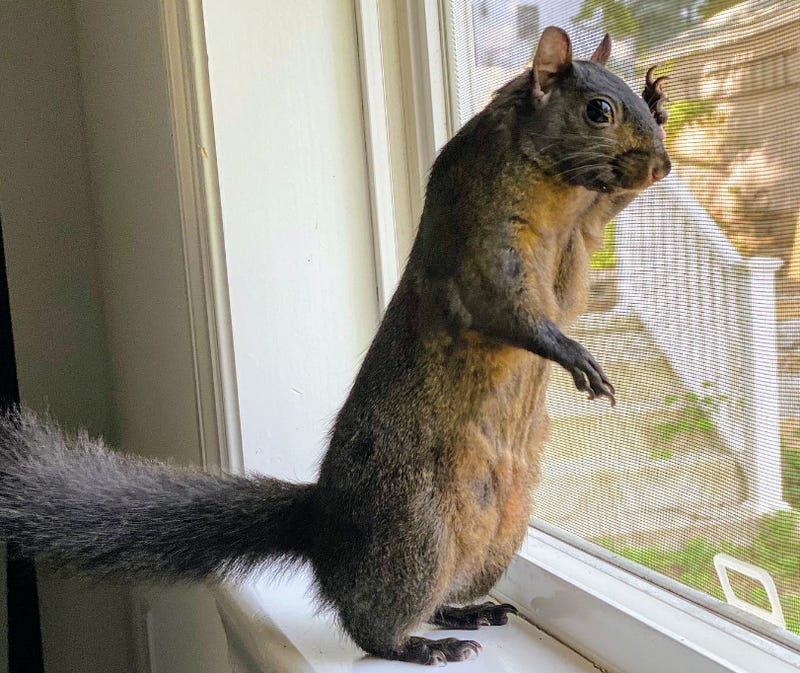Unnecessary Suffering at Peanut’s Freedom Farm: Legal and Ethical Questions Raised Over Animal Welfare and Euthanasia
Examination of Legal Boundaries and Ethical Dilemmas in Animal Sanctuary Management
According to the World Health Organization (WHO), bites from rodents, including squirrels, typically do not carry the risk of rabies transmission1. Even if such transmission were possible, the incubation period for rabies in squirrels ranges from 18 to 86 days2. Peanut, also known as P'Nut, was a pet eastern grey squirrel who had been living indoors for seven years, was well beyond this incubation period when government agents took him for euthanasia last week without clear reason.
Furthermore, it is claimed that these agents also prevented the owner, Mark Longo, from providing food to other animals at the sanctuary3, leading to a situation where these creatures, notably horses which are particularly susceptible to dehydration4, went without food for five hours.5
Animal Cruelty Laws in New York State6:
Deprivation of Necessities: Under New York law, depriving an animal of food or water, like horses, can be charged as a Class A misdemeanor.
Water Deprivation: A horse deprived of water for five hours, particularly in conditions necessitating regular hydration, faces risks of dehydration which can lead to serious conditions like colic.
Food Deprivation: While missing one meal might not critically harm a horse, extended periods without food can lead to significant health deterioration. The owner, Mark Longo, reported that the horses at Peanut’s Freedom Farm missed two meals7.
Legal Considerations8:
Suffering: If animals suffer due to lack of access to food or water, this could legally be interpreted as cruelty or neglect.
Intent or Neglect: Intentional withholding of necessities would likely be viewed more severely than an accidental oversight, especially if the oversight was not promptly corrected. In this case, the deprivation extended over five hours.
Potential Legal Violations:
Was the Government in Violation? If government agents intentionally or recklessly caused distress or health issues by preventing horses from accessing necessary food or water for five hours, this action might be seen as a violation of animal cruelty laws.
https://www.who.int/news-room/fact-sheets/detail/rabies
https://meridian.allenpress.com/jwd/article/8/1/99/126861/EXPERIMENTAL-RABIES-INFECTION-IN-WILD-RODENTS
https://nypost.com/2024/11/02/us-news/caretaker-of-peanut-the-squirrelreeling-over-five-hour-raid-of-his-house/
Flaminio, M J, and B R Rush. “Fluid and electrolyte balance in endurance horses.” The Veterinary clinics of North America. Equine practice vol. 14,1 (1998); https://pubmed.ncbi.nlm.nih.gov/9561693/
https://youtube.com/clip/UgkxYz3OBhIedkyIV1TZvWlo3B8PL8mZWIeA?si=g9vKOAN18mA0IfFJ from Peanut The Squirrel's Owner Rips New York for Seizing, Killing Social Media Star | TMZ Live
https://www.animallaw.info/statute/ny-cruelty-consolidated-cruelty-statutes#s353 Agriculture & Markets Law § 353: This section outlines that a person who overdrives, overloads, tortures, or cruelly beats or unjustifiably injures, maims, mutilates, or kills any animal, or deprives any animal of necessary sustenance, food or drink, is guilty of a misdemeanor. This law covers acts of neglect where animals are not provided with their basic needs, which includes food and water.
https://youtube.com/clip/UgkxYz3OBhIedkyIV1TZvWlo3B8PL8mZWIeA?si=g9vKOAN18mA0IfFJ from Peanut The Squirrel's Owner Rips New York for Seizing, Killing Social Media Star | TMZ Live
https://www.animallaw.info/statute/ny-cruelty-consolidated-cruelty-statutes#s353 Agriculture & Markets Law § 353: This section outlines that a person who overdrives, overloads, tortures, or cruelly beats or unjustifiably injures, maims, mutilates, or kills any animal, or deprives any animal of necessary sustenance, food or drink, is guilty of a misdemeanor. This law covers acts of neglect where animals are not provided with their basic needs, which includes food and water.


